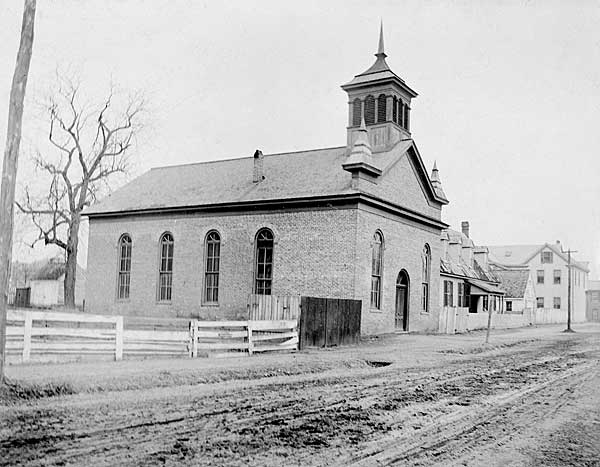LET FREEDOM RING
Founded in 1776, a Historic Black Church Challenges
the Nation to Ring a Long-Stilled Bell
Against a contemporary backdrop of racial tension, Colonial Williamsburg to restore a church bell silent since segregation and let it ring for freedom for all of Black History Month
In 1776, the year of America’s independence, a group of enslaved men and women secretly founded the First Baptist Church in Williamsburg, Virginia. The church, which celebrates its 240th anniversary in 2016, is today one of the country’s oldest African-American houses of Baptist worship1, and a symbol of the faith, struggle, and perseverance that marks the black experience in America. The First Baptist Church — whose first members met under thatched arbors in the woods — moved to a brick church building before the Civil War and acquired a bell in the late 19th century. Since the days of segregation and Jim Crow, the bell has been inoperable…unheard throughout the tumult and progress of the civil rights movement and in the presence of famed worshipers including Dr. Martin Luther King, Jr. and Rosa Parks. The Colonial Williamsburg Foundation, which had a key role in building the church at the current site, has pledged to restore the bell to working condition and to challenge the nation to ring it throughout the day — every day — for Black History Month in February 2016.
“Bells call people to faith. They send folks forth to do good work in the world,” said Reginald F. Davis, Pastor of First Baptist Church. “But Dr. Martin Luther King, Jr., who prayed in our church, also said that freedom rings. A silent bell represents unfinished work of freedom and equality. This bell, in this sacred and historic church, will be silent no more.”
An engineering and conservation team led by Colonial Williamsburg experts determined the age, foundry, and provenance of the bell, and has completed the painstaking process of restoring it in time for it to toll throughout Black History Month.
“We are going to challenge the nation, Americans of every color, faith, and creed, to take a turn at ringing the bell,” said Mitchell B. Reiss, president and CEO of The Colonial Williamsburg Foundation. “This church and this bell follow the arc of the American story of independence, but this was a dream deferred for far too many. As a nation we constantly strive to form a more perfect union, based on liberty, rule of law, and human dignity, and as current events remind us, that work is forever unfinished.” Celebrities like superstar vocalist Kelly Price are planning to “Let Freedom Ring” and invite everyone to take the “Let Freedom Ring Challenge.”
Black History Month also will be honored by Colonial Williamsburg, the First Baptist Church, and The College of William & Mary with an unprecedented range of special programs offered daily during the month of February. This will include a new exhibition at the Abby Aldrich Rockefeller Folk Art Museum, A Century of African-American Quilts; daily lectures and live theater throughout the historic area; concerts, film festivals, oral histories; and gospel music and church services at the First Baptist Church. One of Colonial Williamsburg’s full-time interpreters — James Ingram — portrays the first pastor of First Baptist Church, the enslaved preacher, Rev. Gowan Pamphlet.
“Colonial Williamsburg is in the story-telling business,” said Ingram. “We tell the story of America, including our arduous journeys through prejudice and injustice. We want people to come and take their turn at the bell rope, to take their place in the American story, and to help heal the nation of the divides that remain among us.”
Colonial Williamsburg’s conservation efforts at First Baptist Church go beyond those for the bell itself. In addition, Colonial Williamsburg’s team has cleaned and conserved several historic communion vessels owned by the church, as well as two marble carved gravestones from 1851 and 1866 that marked the graves of two free blacks buried in Williamsburg.
“Colonial Williamsburg is pleased to bring its conservation expertise to bear on the preservation of these important artifacts, which help to illustrate the deep and rich history of Williamsburg’s African-American community,” said Ronald L. Hurst, Colonial Williamsburg’s vice president for collections, conservation, and museums and its Carlisle H. Humelsine chief curator.
The Let Freedom Ring challenge is made possible in part by a generous grant from the Ford Foundation of New York.
For more information, or to reserve your spot to ring the bell please visit LetFreedomRingChallenge.org

